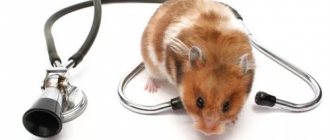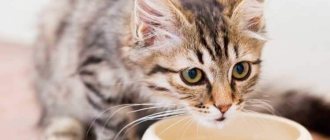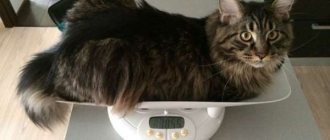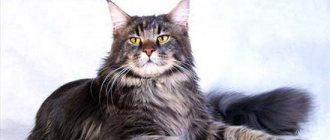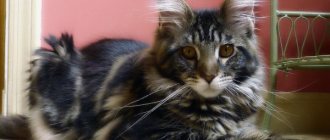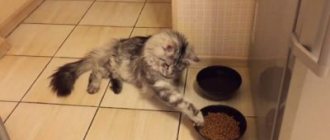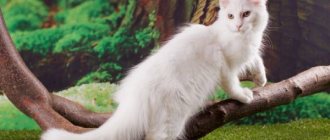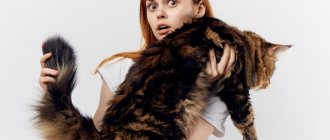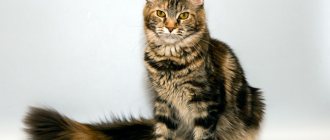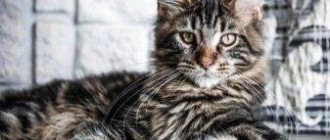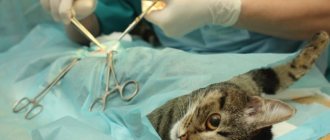Many are of the opinion that the life expectancy of purebred cats is almost always shorter than that of “yard” cats, and that of large cats – shorter than that of small ones. Thus, Maines fall into the “risk zone” in both respects - they are purebred and very large. For novice owners of "coon" cats from Maine, the question of how long Maine Coons live and what hereditary diseases can occur in representatives of this breed is of great importance.
Maine Coon mix cat Velvet from America is the oldest of the cats - he is 26 years old.
Of course, there is no reason to fear that your pet will leave you ahead of time just because it is big. This common misconception arose due to the fact that cats began to be attributed with canine characteristics - in dogs, life expectancy, in fact, has some correlation with size. However, this is not typical for cats, although each cat breed has its own characteristic problems.
Diseases of the cardiovascular system
Maine Coons have a fairly strong immune system. But if for some reason the cat is constantly sick from an early age (especially uremia or panleukopenia), it may develop myocarditis or endocarditis.
The same problems cause long-term use of medications.
Heart problems (narrowing of the aorta or pulmonary artery) occur in Maine Coons that were bred by crossing breeding individuals. The main symptoms indicating heart problems: swelling, shortness of breath, hypothermia, weakness, cardiac cough.
Maine Coons have various diseases of the cardiovascular system/Yandex Collections
What signs of illness should prompt you to see a doctor?
You most likely will not miss an infectious disease.
If a cat is sad, has a temperature above 39 degrees, dull fur, dull eyes, coughing, vomiting, diarrhea, and so on, you need to consult a doctor. It is easier to miss a life-threatening condition that is not infectious and does not cause acute concern to the owner. For example, an acute attack of allergies or pulmonary edema. So don't ignore your cat if her face becomes swollen or she begins to pant while at rest. It's best to call your veterinarian right away with your symptoms and have antihistamines and diuretics in your first aid kit just in case. About the breed Choosing a kitten Documents Property Nutrition Health Contents Education Care Neutered Cattery Breeding Exhibitions
Diseases of the musculoskeletal system
Problems with the musculoskeletal system or musculoskeletal system can affect a Maine Coon, both healthy and with a weakened immune system.
Joint inflammation
It can cause microtraumas that develop with constant jumping or if the cat often falls. Arthritis develops from microtraumas, and if bacteria enter the joint cavity, then purulent arthritis also develops.
The disease manifests itself in swelling, pain, limited joint mobility, lameness, and fever.
Maine Coons have quite strong immunity/Yandex Collections
Rickets
This is a problem that occurs due to poor nutrition at an early age or in case of a digestive system disorder, lack of sun, or infestation with worms.
As a result, calcium, phosphorus and other beneficial substances are poorly absorbed, resulting in a deficiency that affects bone development.
The main signs: large belly with short stature, thickening of joints, ribs, lameness, spinal deformity. There is also a general lag in physical development.
How can you tell if your cat is sick?
A healthy Maine Coon is a cheerful, active cat with an excellent appetite and excellent coat . However, owners must be attentive to their pets.
Important! The appearance of the first signs of illness, a sudden change in behavior or appearance should cause concern and become a reason to seek qualified help.
A sick animal may exhibit the following signs:
- The appearance of discharge from the eyes. They can be of various types - both transparent and purulent or mucous.
- Excessive salivation, as well as plaque or sores on the tongue and gums.
- Indigestion. Vomiting and various stool disorders are typical signs of malfunctions of the digestive system. Concern should also be caused by the presence of blood, foam, worms in the animal’s stool, as well as a significant change in its color.
- Urinary disorders. These include: too frequent and excessive urination, urinary incontinence, pain when urinating or its complete absence.
- Respiratory rate disturbance. It may become rare or, conversely, more frequent. Shortness of breath, coughing, and wheezing may occur, which indicate a number of serious health problems in the animal.
- Enlarged lymph nodes. Their increased size indicates the presence of inflammatory processes in the body of Maine Coons. The lymph nodes located under the lower jaw are the first to react to this. Therefore, the owner’s task is to know the location of the latter and periodically check their condition.
- Intense thirst. This is the main symptom of a number of diseases: diabetes, kidney disease or kidney failure, uremia or the common cold.
- Deterioration of the coat condition. If the Maine Coon's coat suddenly lost its shine, became disheveled, shedding increased, the color and elasticity of the skin changed, then the animal may have become ill.
Return to content
Genetic diseases of the breed
The Maine Coon breed has diseases like any other breed of animal. These cats have several genetic diseases that every owner should be aware of.
Cardiomyopathy
This is heart disease. In this case, the myocardium is thickened, so the lumen of the heart chambers decreases and coronary circulation is disrupted. All this causes heart failure, accumulation of fluid in the lungs, and the appearance of rhombuses.
The disease may not manifest itself for a long time, but then turns into a sudden death.
The first symptoms: the cat gets tired quickly, does not play, constant shortness of breath, even without physical exertion, difficulty breathing, cyanosis of the mucous membranes, paralysis of the hind legs.
Paroxysmal spinal amyotrophy
The disease is caused by a gene inherited from both parents. The first symptoms may appear from 4 months, but psychologically the animals develop normally.
Kittens do not experience pain, but this significantly limits their motor function. To keep such animals, warm rooms are recommended, as comfortable as possible, without access to high cabinets from which the animal can easily fall.
Symptoms: slight muscle tremors, muscle weakness, which clearly affects the cat’s movement and stability, unnatural postures, chaotic muscle contractions.
Maine Coon cats have several genetic diseases/Yandex Collections
Hip dysplasia
The head of the articulation does not connect to the acetabulum of the pelvis. Because of this, the friction of the articular heads is disrupted, the cartilage becomes thinner, arthrosis and dislocation appear. Over time, limb dysfunction develops.
Symptoms: it is difficult for the cat to play, it hurts to walk, she constantly limps.
What else do Maine Coons get sick with?
The main diseases of Maine Coons were described above, but there are three more that can be observed quite often in cats, including this breed.
Urinary tract diseases
Ureteral stones are a common problem in Maine Coons. Castrated animals are especially prone to it. The cause is a lack of water, a violation of the pH of the urine. This leads to the development of oxalates, which complicate urine excretion.
The disease manifests itself in pain when urinating, blood in the urine, and scanty urine. The cat will sit in unusual positions on the tray and may even start going to the toilet in the wrong places.
Infectious and helminthic diseases
This breed can suffer from parvovirus and leukemia. In addition, infection with Giardia, Salmonella, and Coccidia may occur. Problems include vomiting, indigestion, and blood in the stool.
Diarrhea is also observed with fluke worms, whipworms, toxocara, and cucumber tapeworm. These diseases may cause hyperthermia, weakness, and refusal to eat. Often helminthiasis causes the development of allergies.
Maine Coons also have infectious and helminthic diseases / Yandex Collections
Gum diseases
Gum diseases develop in those cats that are not tamed to solid food and in those that eat directly on the street, from the ground. Such food may contain dangerous bacteria, which can cause gum inflammation. Symptoms include tooth loss, stomatitis, and bleeding gums.
Diagnosis and treatment of Maine Coon diseases
Regardless of what sign of illness the cat shows, it is necessary to immediately take him to the veterinarian. Many illnesses develop quickly. The Maine Coon is in good health, but if the immune system is weakened, the problem may worsen.
To determine the type of disease, a cat can undergo various tests at a veterinary clinic (ECG, ultrasound, MRI, CT, X-ray, biochemical analysis of urine, blood, feces). It all depends on the symptoms and their development.
Treatment is prescribed based on the type of disease, its course, and stage. Sometimes ordinary vitamin complexes are enough, in other cases antibiotics, antiviral drugs, and antispasmodics are required.
Surgery may also be prescribed for certain diseases. Whatever illness your Maine Coon has, the disease can be identified at an early stage, but if you delay going to the vet, it will be more difficult to save the animal.
Cost of a kitten
A kitten of this breed is quite an expensive pleasure. Prices vary greatly depending on the purpose for which the pet is purchased: for exhibitions, breeding, or, as they say, “for the sofa.”
Kittens that meet the breed standard are usually purchased in order to be bred and shown at various competitions. The cost of such individuals starts from 100 thousand rubles, and this is far from the limit. The price is determined by the breeders themselves, and may vary depending on the region.
Kittens that have any deviations from the standards are cheaper, but also not cheap - about 60 thousand rubles. Such a cat will not be accepted for an exhibition and is not suitable for breeding, but this does not mean that he cannot become a wonderful friend, companion and favorite of the whole family.
Photo gallery of Maine Coons:
Prevention
Of course, preventing a disease from occurring is easier than treating it. What preventive measures help in the case of Maine Coons?
- Carry out scheduled vaccinations on time. This applies to both street cats that walk regularly and indoor cats. Because the virus or helminths can be brought into the house by the owner himself on shoes and clothes.
- Timely treatment for worms, fleas, and ticks.
- Many Maine Coon diseases appear in later stages. Therefore, it is worth regularly checking the animal at the veterinary clinic. It is enough to bring your cat for examination once every 6-12 months.
- Proper, balanced nutrition. They usually choose special food, but if desired, you can provide the animal with all the necessary substances when feeding it regular food. It is only advisable to consult with a specialist to create a complete menu.
- Active lifestyle. The Maine Coon is a big animal for a cat. He has a well-developed skeleton and muscular system and constantly requires exercise. This means that you need to provide him with regular walks (if possible) and games. The cat should not constantly lie on the sofa - activity helps to avoid the development of obesity and many heart diseases.
If you treat your cat carefully, provide everything necessary, and conduct regular checkups, he will be healthy and active. Possible diseases can be identified in the early stages and treated in a timely manner.
